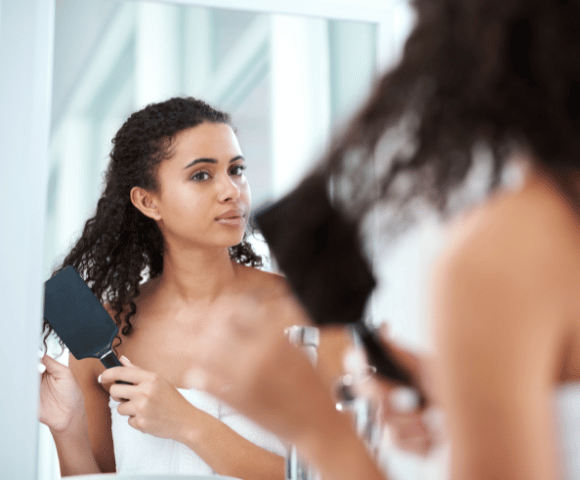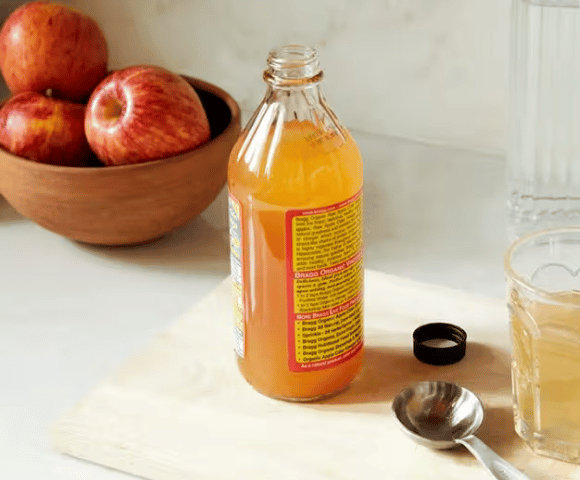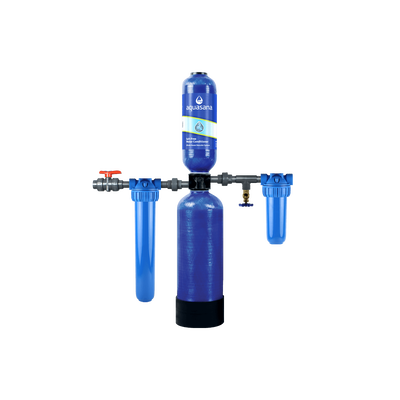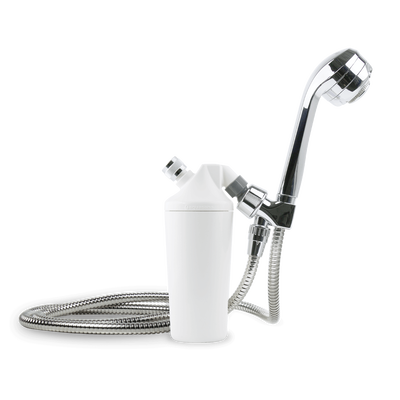Hard water effects on hair
The most common minerals found in hard water are calcium and magnesium, which are known to destroy the lathering effect of soaps and shampoos. While these minerals are not dangerous, the high levels of TDS found in hard water can have several negative effects on your hair.
Effects of washing hair with hard water
Hard water is harsh on your hair, and washing with it can:
- Make your hair brittle – Hard water tends to be more alkaline, or basic, and repeated exposure to alkaline water is known to dry out hair, making it more brittle and prone to breakage.
- Increase tangles and knots – Hair that’s dried out because of hard water also creates more friction between strands, leading to more tangles and knots.
- Dull your strands – Because hard water makes it difficult for soaps to lather and sud, you may find your hair becoming duller over time.
- Dry out your scalp – The buildup of minerals in your hair from hard water can cause your scalp to dry out and possibly become itchy and flaky.
- Make hair greasy – When your scalp is dry, your body may overproduce oil to compensate, which can lead to your hair becoming greasy.
- Discolor light-toned and color-treated hair – Mineral deposits from hard water can cause color-treated hair to fade quicker and change the natural color of your hair over time.
For any beauty aficionado, the effects of hard water on your hair may feel scary, but there are options to address the issue. Washing hair with filtered water, especially if you’re also using a softener or conditioner, can make your shower water more gentle and provide protection against contaminants. Alternatively, you can use natural remedies like the “no poo” method which involves washing hair without shampoo. Below, we’ll discuss several no poo routines you can try at home.
What is the no poo method?
The “no poo” method is a way of washing hair without using shampoo. There are a couple of options for going no poo, from washing your hair with only water or using just a few simple, natural products like vinegar and baking soda to cleanse your strands. The no poo method came about to help people reduce the number of chemicals they use on their bodies, in their homes, and to help restore damaged hair to its natural beauty.
Benefits of the no poo method
Going no poo can offer several benefits for your hair such as:
- Improve the texture of natural hair
- Add lift and volume to hair
- Balance the amount of oil the scalp produces (which means less hair washing!)
- Reduce reliance on styling products
- Reduce the amount of plastic waste in your home

These benefits and more have made the no poo method skyrocket in popularity in recent years. If you’re dealing with hard water and looking for ways to reduce damage to your hair, the no poo method is worth trying because you can do it without spending a lot. In the following section, we’ll walk through some different no poo routines using common household ingredients.
No poo routines to try at home
There are several ways to go about the no poo method, and the option that works best may differ from person to person. To see if no poo helps your hair when washing with hard water, you might want to experiment with different routines and see which produces the best results. Here are a few easy to try no poo routines you can do with common household ingredients:
Baking soda shampoo recipe
So this is actually a two-part routine. Part one involves using baking soda to create a natural paste that scrubs the scalp, while part two uses an apple cider vinegar rinse to balance the hair’s pH and seal hair cuticles for strands that are soft and shiny.
Ingredients:
2 tablespoons baking soda
1.5 cups of boiled water
Directions:
Bring your 1.5 cups of water to a rolling boil and then turn off the heat. While the water is still hot, add 2 tablespoons of baking soda. The soda will fizz and bubble when it hits the water — this is good since the baking soda is dissolving into the water. Take a spoon and stir in any leftover baking soda that stays solid on the bottom of your pot. Let the water cool, and then transfer it into whatever container you keep your solution in.
When you’re using a no poo baking soda solution on your hair, if the baking soda to water ratio is correct, the solution should feel very different from just putting plain water on your hair. The baking soda-laced water will feel slippery, and you should gently massage it through your hair and scalp until you can no longer feel the solution anymore. Follow up with an apple cider vinegar rinse, which we’ll show you how to make below.
Apple cider vinegar rinse
After washing with a baking soda mix, we highly recommend rinsing your hair with an apple cider vinegar rinse that helps seal cuticles and balance your hair’s pH.
Ingredients:
2.5 tablespoons apple cider vinegar
1 cup of boiled water
Directions:
You can use either apple cider vinegar or white vinegar to “condition” your hair, but apple cider vinegar tends to be the most common choice. It’s best to keep your apple cider vinegar rinse in a spray bottle and only spray from the earlobes down to the ends. After spritzing your hair with the apple cider vinegar mixture, let it sit for a minute or two, then rinse your hair with cold water.
An apple cider vinegar rinse will help mitigate the oily feeling you’ll experience in the transition phase of no poo and also help break down the minerals found in hard water. Additionally, hard water tends to be higher on the pH scale, meaning it is more basic, so using an acidic rinse, like apple cider vinegar, will help balance the pH of your strands and promote strength, shine, and softness.

Coconut oil routine
Coconut oil is rich in fatty acids and vitamin E, which help it penetrate the hair shaft to provide essential nutrients that fortify its structure, promote scalp health, and improve hair strength.
Ingredients:
1 tablespoon of unrefined coconut oil
Directions:
This no poo routine is easy to try, and there are two ways to go about it. You can measure 1 tablespoon of coconut oil and place it in a small dish, then microwave for 15 seconds right before you shower to melt it into a liquid form. Alternatively, you can place the jar of coconut oil on a shower shelf or the shower floor — the steam should melt the coconut oil and you can simply pour a little into your hand. Gently massage the coconut oil into your hair and scalp and let it sit while you shower before rinsing out thoroughly. You can use it as a mask by letting it sit for 30 minutes after you shower, but the oil may harden and be difficult to get out of your hair.
Washing with only water
The most basic no poo method involves using only water, and this is sometimes viewed as the final stage in a noo poo journey because it doesn’t involve any products or solutions. Instead, you’re relying on your hair’s natural oils to sustain healthy strands.
Ingredients:
Tap water
Directions:
Washing with only water is as simple as it sounds, though you can make the routine a little more effective by adjusting the temperature of your water. Hot water opens hair follicles so it’s easier to remove product buildup and excess oil, while cold water seals the cuticles to lock in moisture. We’d recommend starting your wash by cleansing with hot water, then ending with a cold rinse to seal the cuticle. Just keep in mind that hot water will dry out strands, so don’t turn up the temperature all the way and try to keep your shower under 10 minutes to avoid damage. Also, since you have hard water, this method may be less effective since the water you’re using is harsher on your hair.
Understanding the no poo transition phase
The transition phase of the no poo method is by far the hardest part. This is the phase where you wean your hair off of shampoo and conditioner and onto natural products.
When you use shampoo, the soap strips your hair and scalp of the natural oils your body produces. Regular use of shampoo (especially daily use) can cause the oil glands in your scalp to over-produce oil because those oils are being constantly stripped away. Thus, when you stop using shampoo, you have allowed time for your scalp to re-adjust and return to normal oil production. This transition can take a few weeks to several months.
Once the transition phase has subsided, and you’re washing your hair at 4-5 day intervals, the oils will start to even out.
Mitigating hard water effects on your hair
If you’re looking for a more long-term solution for the effects of hard water on your hair that also fits with your eco-friendly lifestyle, there are many options out there. For example, the Aquasana Whole House Salt-Free Water Conditioner acts to descale the build up in your water, leaving your pipes clear, your appliances longer-lasting and your water free from TDS build up.
For those who are going no poo, this will make it much easier to make your natural shampoo and apple cider vinegar rinse. Plus, with the Aquasana Whole House Salt-Free Water Conditioner, it doesn’t waste excess water, doesn’t use power or electricity, and doesn’t require salt.
If you live in an area that has especially hard water and need a softener, our SimplySoft® 40K & 60K Grain Softeners use 50% less salt and generate 28% less wastewater than traditional softeners*. They're also IAPMO certified to NSF/ANSI Standard 44 for the reduction of water hardness, so you can get exceptional performance with a lower environmental impact than other softeners.
Organic shopping and living might require a little extra effort, but it shouldn’t require you sacrificing your appliances, cleaning time, and hair to hard water. Investing in your organic lifestyle also means investing in healthy skin and hair, and trust us, your skin and hair will thank you for it.
* Based on metered operation mode compared to standard time-based regenerated softeners.
WHOLE HOUSE WATER SOFTENER
SimplySoft® 40,000 Grain Softener
Reduces minerals that cause hard water, providing softer, scale-free water from every tap in your home.
.png)


